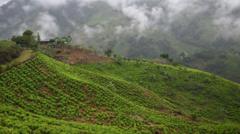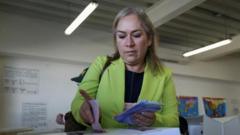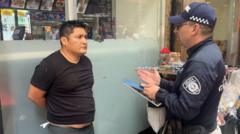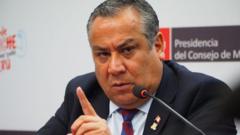Ecuador has transformed into a key conduit for cocaine flowing from South America to Europe, largely controlled by the Albanian mafia. With a staggering 70% of the world's cocaine now passing through its ports, the increase in drug trafficking correlates with surging European consumption. Gang violence and brutal recruitment tactics pose dire challenges for locals caught in the crossfire, while Ecuador's government seeks international cooperation to tackle the epidemic in their country.
The Growing Cocaine Corridor: Ecuador's Role in Europe's Drug Trade
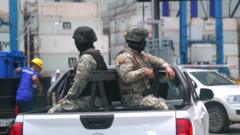
The Growing Cocaine Corridor: Ecuador's Role in Europe's Drug Trade
An inside look at how Ecuador has become a pivotal player in the global cocaine trafficking network, driven by rising European demand and the Albanian mafia's grip on the trade.
Article text:
Ecuador has emerged as a significant link in the global cocaine trafficking chain, with its strategic location being exploited by international crime syndicates. Notably, the Albanian mafia has established a strong foothold in the country, facilitating the transport of cocaine originating from Colombia and Peru, the world's largest producers of the drug.
“Ecuador is not a producer of cocaine, yet 70% of it now flows through our ports,” remarks President Daniel Noboa, highlighting the alarming situation. The Colombian and Peruvian cartels now view Ecuador as a vital transit point due to its extensive port infrastructure. This troubling trend is evidenced by a record rise in drug seizures that underscore the growing scale of illicit exports.
Many people in Ecuador, like César—who operates within a local gang—are trapped in the illicit drug trade, coerced into roles by the threat of violence. “If the Albanian mafia calls, you either comply or face severe consequences,” states César, whose life reflects the grim realities faced by those entangled in drug trafficking.
Despite not being the primary producers, ordinary citizens such as truck drivers find themselves unknowingly transporting drugs camouflaged within legitimate cargo. Laws raised by the heightened consumption of cocaine in Europe, particularly in the UK, contribute to an increasingly dangerous criminal environment in Ecuador, a phenomenon that has twigged alarmingly in recent years.
Police and armed forces patrol the ports, desperately trying to stem the tide of drug shipments while battling rampant corruption among port workers. Cocaine exports cleverly disguised within legitimate goods, predominantly bananas, present massive challenges for law enforcement. Major police figures assert that traffickers now deploy advanced methods to infiltrate shipping logistics, thus complicating interdiction efforts.
The lure of financial reward drives many into this treacherous landscape, even inducing some to create fake businesses as fronts for trafficking operations. However, an underlying resentment towards foreign gangs is palpable among the local populace, echoing calls for Europe to address rising drug demand that fuels the violence.
Recent UN data illustrates that global cocaine consumption has reached unprecedented levels; European markets, especially in the UK, continue to demonstrate swelling demand. According to the UK's National Crime Agency, cocaine use has risen significantly, causing detrimental ripple effects—both socially and economically—across Ecuador.
As President Noboa prepares for a crucial election, he has vocalized the need for international collaboration to combat organized crime. "The cycle of violence perpetuates with every shipment sent out," he emphasizes, indicating a larger narrative of accountability tied to consumer nations.
Ecuador's plight within this complex web of drug trafficking is caught between the lure of economic gain and the dire consequences of escalating gang violence. It is evident that a collective response from both producer and consumer nations is paramount to dismantling the avalanche of devastation transferred through the brutal cocaine trade.
Ecuador has emerged as a significant link in the global cocaine trafficking chain, with its strategic location being exploited by international crime syndicates. Notably, the Albanian mafia has established a strong foothold in the country, facilitating the transport of cocaine originating from Colombia and Peru, the world's largest producers of the drug.
“Ecuador is not a producer of cocaine, yet 70% of it now flows through our ports,” remarks President Daniel Noboa, highlighting the alarming situation. The Colombian and Peruvian cartels now view Ecuador as a vital transit point due to its extensive port infrastructure. This troubling trend is evidenced by a record rise in drug seizures that underscore the growing scale of illicit exports.
Many people in Ecuador, like César—who operates within a local gang—are trapped in the illicit drug trade, coerced into roles by the threat of violence. “If the Albanian mafia calls, you either comply or face severe consequences,” states César, whose life reflects the grim realities faced by those entangled in drug trafficking.
Despite not being the primary producers, ordinary citizens such as truck drivers find themselves unknowingly transporting drugs camouflaged within legitimate cargo. Laws raised by the heightened consumption of cocaine in Europe, particularly in the UK, contribute to an increasingly dangerous criminal environment in Ecuador, a phenomenon that has twigged alarmingly in recent years.
Police and armed forces patrol the ports, desperately trying to stem the tide of drug shipments while battling rampant corruption among port workers. Cocaine exports cleverly disguised within legitimate goods, predominantly bananas, present massive challenges for law enforcement. Major police figures assert that traffickers now deploy advanced methods to infiltrate shipping logistics, thus complicating interdiction efforts.
The lure of financial reward drives many into this treacherous landscape, even inducing some to create fake businesses as fronts for trafficking operations. However, an underlying resentment towards foreign gangs is palpable among the local populace, echoing calls for Europe to address rising drug demand that fuels the violence.
Recent UN data illustrates that global cocaine consumption has reached unprecedented levels; European markets, especially in the UK, continue to demonstrate swelling demand. According to the UK's National Crime Agency, cocaine use has risen significantly, causing detrimental ripple effects—both socially and economically—across Ecuador.
As President Noboa prepares for a crucial election, he has vocalized the need for international collaboration to combat organized crime. "The cycle of violence perpetuates with every shipment sent out," he emphasizes, indicating a larger narrative of accountability tied to consumer nations.
Ecuador's plight within this complex web of drug trafficking is caught between the lure of economic gain and the dire consequences of escalating gang violence. It is evident that a collective response from both producer and consumer nations is paramount to dismantling the avalanche of devastation transferred through the brutal cocaine trade.


